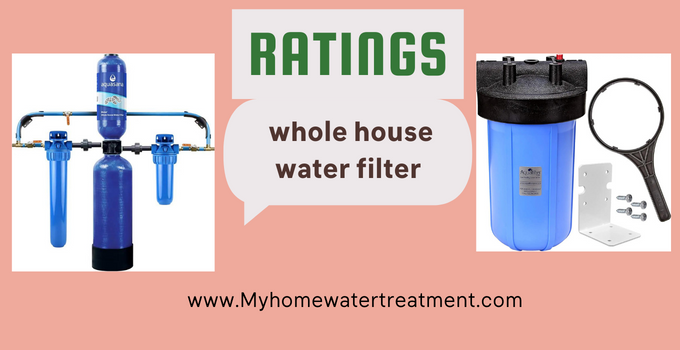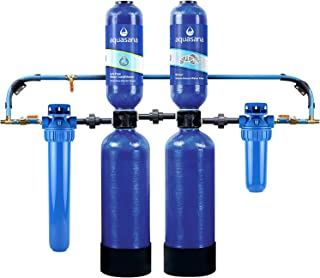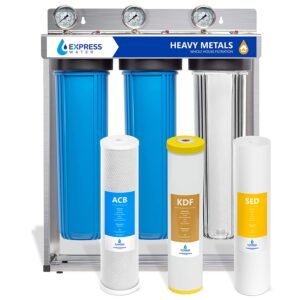When looking for the best whole-house water filter, you need to first assess your needs based on the water that is flowing into your house. Are you trying to filter water from a good source on-property? Or do you plan to filter water from a city or municipal source?

If your water supply is from a municipal source, you need to check out what’s called a Consumer Confidence Report. This is a water report that will explain what is in the water sent to your home or business in your area.
Once you’re armed with this information, the ratings and technical information about these filtration systems will start to make more sense. If you’re looking at treating well water, you’ll probably need to screen out any sediment.
Well water is sometimes susceptible to bacterial or viral matter, such as Giardia, cryptosporidium, or any number of microscopic organisms due to the water being untreated by a municipality. Sometimes there may even be heavy metals or chemicals in well water.
If this is the case for you, you’ll need to think about employing some sort of UV system to kill off any microorganisms/bacteria/viruses in your water. The way this happens is that water moves from your well source through a section of pipe made of stainless steel. In this stainless steel section of piping will be a UV lamp. Bacterial and viral microorganisms can’t survive UV exposure, so as they flow through the pipe and are exposed to the light, they are eliminated.
If you’re treating water from a municipal source, the water is typically pre-treated at your local water works with chlorine, fluoride, or other non-natural chemicals that can sometimes cause health issues. This is also the reason your tap water may smell and/or taste of chlorine. Fortunately, these chemicals can be eliminated through a whole house water filtration system with the proper filters installed.
A good word to know when reading reviews is ”micron.” A micron is a unit of measure that determines the particulate size of the stuff that each type of water filter or filtration system can remove or sift through. Filtration systems usually range from 50 microns all the way down to 0.5 microns. The smaller the micron size, the smaller the particles it will filter out. Chemicals like chlorine can be filtered out with 5 micron or smaller filter. 20-50 micron filters are typically meant to filter out larger sediments and dirt and rust.

Some Other Things To Check For: Ratings
- How large or small are the fittings and pipes for the system? Large-diameter pipes flow faster and easier, and usually help in maintaining water pressure for things like hoses and shower heads. Smaller-sized systems have their advantages as well; they don’t ‘use’ as much water, so their filters can usually be changed far less frequently.
- Does the system take special filters or are the filter sizes and diameters more universal? Some systems may be highly rated but use very specific filter sizes, sometimes locking you to a specific company or filter type. Others have more common sizes, which is far more useful. If this is the case, it’s usually easy to switch out brands or types of filters for other kinds. This may be good in that you can then pinpoint types of adulterants to remove from your water. Or it may be possible to upgrade to beefier filters, thicker filters, or filters made with different compositions of materials…which might make said filters last longer or work better.
- Does your system even come with a filter or fittings? Or do you have to buy them yourself?
- How is the system installed? Some of the fancier/more expensive systems, and even cheaper systems that just happen to be fairly popular usually have a lot of YouTube videos or articles online that outline their installation. This is obviously handy if you’re going down the DIY-installation route. If not, you may be stuck with either deciphering a small piece of paper that may or may not be in English…or calling a plumber to do the dirty work for you.
- How many people have purchased the system? This feeds off the last question. If the system has a 4-star ranking…but only a small amount of people have purchased it, then that rating is probably not as credible as one that’s been ranked by hundreds of purchasers.

Conclusion: Ratings
We hope this helps you understand water filters and the many rating systems and guides for them online! Good luck with your search and your installation process!